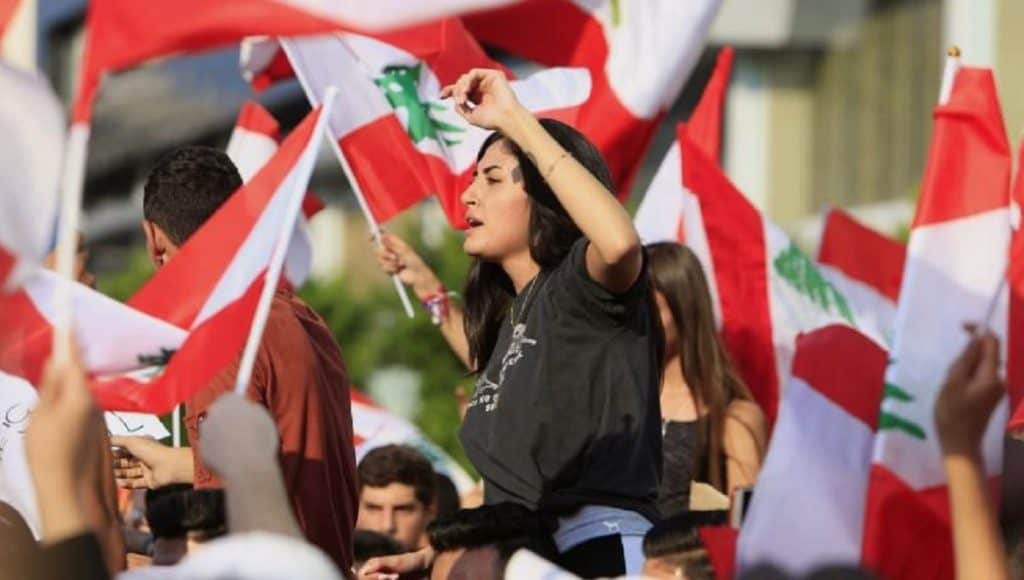Denis Korkodinov – Interview with Elie Hindi
Under the pressure of the social unrest the Lebanese Prime Minister, Saad al-Hariri was forced to resign. However, this did not soften the mood of the protesters, who require a radical transformation of the entire state. Meanwhile, Lebanese President Michel Aoun, apparently, is not ready to make concessions to the crowd, preferring to just wait time in the hope that the protest movement, tired of the struggle for power, will disintegrate on its own. In turn, this wait and see attitude of the Lebanese leadership is even more criticized by the protesters, who began to demand a revolution. All this indicates that Beirut authorities are not able to neutralize social unrest.
Speaking specifically for World Geostrategic Insights, we talked about this with Elie Hindi, Lebanese Forces Party, Foreign Relations Advisor, associate professor of international affairs at Notre Dame University – Louaize.

1. Lebanese Prime Minister Saad al-Hariri resigned under the pressure of the protest movement. However, Lebanese President Michel Aoun has not yet begun the process of forming a new cabinet. In particular, he said that there are certain difficulties in the implementation of domestic political reforms. What difficulties did Michelle Aoun talk about? Does this mean that after the resignation of Saad al-Hariri,Beirut does not intend to make concessions to the protesters? If a new cabinet of Lebanon is formed, what will be its structure? Will the protest leaders get a seat in the new cabinet?
– Lebanese Prime Minister Saad al-Hariri hesitated for more than 10 days before resigning, saying that the resignation of the cabinet would damage the stability of the state and the economy. At the same time, President Michelle Aoun has been postponing consultations on the formation of a new government for more than 10 days, arguing that consultations without prior coordination will lead to greater instability and political risk. Lebanese government and Hezbollah ministers are negotiating behind closed doors outside of official institutions to try to find a way to calm the street without causing them to lose control of power, services and public resources.
Street protesters are very diverse, from the extreme left to the extreme right, and they agree very little to the steps that the government offers them. However, one problem that the protesters agreed and stated very clearly is that they have lost confidence and confidence in the ruling majority and politics in general, as well as in their ability to properly govern the country and cope with the economic crisis. That is why they asked the cabinet to resign and create a new cabinet of independent experts who inspire confidence and can correct the economic situation through the necessary reforms.
Protesters insist that no previous minister or representative of any political party should enter the new cabinet. However, the protest leaders do not have a clear leadership that could lure officials into positions.
If the protesters succeed, the ministers of the old government and Hezbollah, who controlled the previous cabinet, will be the biggest losers at their level.
Thus, unfortunately, in order to be able to win a vote of confidence in the parliament that they control, the new cabinet must be able to give some guarantees to the main political parties that there will be no direct attacks on them or their strategic interests.
2. On November 4, 2019, Lebanon’s sovereign dollar bonds rose in price after almost two weeks of huge losses associated with protests by stocks. In particular, according to analysts, bonds in 2021 received the greatest jump, adding 2.12 cents per dollar, trading at 74.375 cents. Is this related to the resignation of the government of Saad al-Hariri or is it a manifestation of sustainable economic growth in Lebanon? Will this upward trend in the value of sovereign dollar bonds affect the position of Lebanese President Michel Aoun, who will definitely never agree to make concessions to the protest leaders? Is there a risk of a sharp collapse of the Lebanese economy as a result of protests?
– The Lebanese economy is clearly suffering from structural problems and how public financial management has exacerbated these problems over the past two decades. At very high cost, Lebanon’s agriculture and industry are slowly dying. Lebanon is increasingly relying on a very fragile services sector, especially tourism and banking, which, in turn, suffered serious damage: events in the region, poor public finance choices and, as a result, the Lebanese lira pegged to the US dollar. Lebanon’s debt is one of the highest in the world and has exceeded 150% of GDP. In addition to all this, over the past 6 months in Lebanon, the level of public confidence in the state system has been significantly reduced, and this has led to a self-fulfilling prophecy of collapse.
On the other hand, the government promised a lot over the years and at the CEDRE conference in Paris in March 2018 clearly announced its plans to carry out serious structural reforms in the public sector as a prerequisite for international funding and support, including: reducing the number of people employed in the public sector, solving the problem of electricity shortages, partnerships with the private sector in the field of energy management, telecommunications, transport and other sectors.
Almost 2 years have passed, and not one of these reforms has been implemented. Thus, Lebanon has not yet received any promised international support. Today, despite the temporary growth of bonds caused by the dismissal of the cabinet, all indicators clearly show that Lebanon is already at the beginning of an economic collapse. In the best case, and if Lebanon really gets the cabinet of independent professionals that it deserves, and if they take all the necessary measures, people can expect this to help stop the further collapse, stabilize the situation, implement the necessary reforms and lead Lebanon through a very difficult times (from 2 to 3 years) needed to start a serious “recovery” of the economy and politics.
The worst-case scenario is to create an office similar to its predecessors, where political hostility will impede the implementation of major reforms, resulting in a much stronger collapse.
3. Hezbollah is part of the political bloc that won the 2018 election, which gives it control over the Lebanese parliament, most of all lost as a result of the fall of the Saad al-Hariri government. In this regard, what actions can Hezbollah take to strengthen its influence in Lebanon?
– The resigned office of Saad al-Hariri was really the best scenario for Hezbollah, since he could limit his role to economic and managerial affairs, while Hezbollah gained unlimited control over the country’s foreign policy and strategic decision-making process. In addition, the party was able to obtain further legitimacy if the Lebanese president and prime minister recognized and legitimized Hezbollah’s decision-making powers on several strategic issues, including the Syrian war, the conflict with Israel, oil and gas negotiations, relations with Gulf countries.
However, Hezbollah’s military power cannot be used against protesters. And the more the party will resist, the greater will be the reaction against it, especially with an unprecedented number of demonstrations within its constituency.
Hezbollah’s political power and control of the political scene does not depend on its own size, as it has 13 deputies out of 128 and 3 out of 30 ministers in the parliament (about 10%). Together with all its close allies, the party controls 45 deputies and 9 ministers.
The real strength of Hezbollah stems from a concession from the blocs of Lebanese President Michel Aoun (29 deputies and 9 ministers) and Lebanese Prime Minister Saad al-Hariri (21 deputies and 6 ministers). In the fact that Hezbollah received full control over the strategic policy of the state, and the ruling majority in Lebanon received guarantees of the inviolability of their corrupt way of life.
Thus, Hezbollah faces a huge dilemma when any choice harms its control over the country. If the party agreed with the demands of the protesters, it would lose the magic formula that allowed it to control Lebanon. If Hezbollah decides to suppress the protest movement by force, it will lose a huge amount of domestic support and will be perceived as an advocate of corrupt politicians. In this regard, the party’s actions are paralyzed. She can do nothing.
Image Credit: REUTERS/Ali Hashisho







